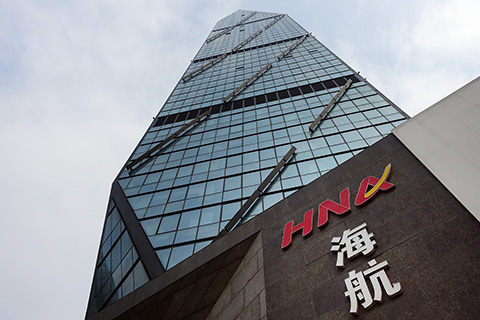China’s Mega-Dealmakers Pivot to Recoup Capital

Some of China’s boldest foreign dealmakers are racing to raise capital by issuing bonds and selling assets, signaling a retreat from an overseas shopping spree that lasted several years and added up to tens of billions of dollars.
HNA Group, which owns large stakes in Deutsche Bank and Hilton Worldwide, picked up the pace in issuing bonds at home and overseas in recent months. The push has fueled speculation that HNA’s aggressive acquisitions strained its finances.
Since late November, HNA has issued at least two batches of short-term bonds at home through subsidiaries, despite a recent rout in the bond market that drove up funding costs. On Nov. 30, Lucky Airlines, HNA’s Yunnan-based subsidiary, sold 75.7 million yuan ($11.4 million) in bonds in China’s most expensive short-term bond issuance ever — at a rate of 8.2%. In late October, HNA’s Hong Kong subsidiary Hainan Airlines Hong Kong Co. issued $300 million worth of bonds overseas.
Other Chinese conglomerates, including Fosun International Ltd. and Dalian Wanda Group, have set their own brisk pace in seeking financing. Fosun — whose businesses cover real estate, financial services, mining, pharmaceuticals, retail and entertainment — last week issued three-year dollar bonds to raise $300 million through Fortune Star BVI, its overseas vehicle.
Wanda, the world’s biggest private property developer-owner and cinema-chain operator, was hit by a bond sell-off in June. It has raised 1.55 billion yuan from two domestic-bond issuances since June, publicly available market documents show.
In addition to accelerating fundraising by issuing bonds, the companies have moved to sell assets to recoup capital after years of heavy spending. HNA Chief Executive Officer Adam Tan told the news media in late November that the company was considering selling some assets, including properties in New York and Sydney, and minority stakes in small companies.
“HNA has done lots of mergers and acquisitions over the past few years, and the company is now adjusting its portfolio according to the government’s policies for overseas investment,” said Tan, adding asset sales have generated ample cash flow for the company.
HNA has been one of China’s most aggressive dealmakers in recent years. The company has spent more than $25 billion since 2015 on global assets, expanding from an airline operator to a tourism and financial conglomerate. Its major deals include a $6.5 billion investment in U.S. hotel giant Hilton Worldwide Holdings Inc., the $2.5 billion purchase of aircraft-leasing specialist Avolon Holdings Ltd. and the $775 million acquisition of the oil-products and logistics business of Swiss trading and mining giant Glencore.
The company backed off its overseas shopping spree beginning early this year after Beijing tightened scrutiny on companies’ overseas investment amid concern about surging capital flight and debt risks.
In June, the China Banking Regulatory Commission ordered commercial banks to study bad loan risks related to major dealmakers, including HNA, Fosun and Wanda. Banks have since tightened credit control on those companies, sources close to the matter said.
Amid speculation that HNA is under capital pressure, the company on Dec. 10 issued a statement saying it still has 310 billion yuan in unused credit lines from major banks.
But a source from HNA told Caixin that the company missed some scheduled loan repayments due several months ago, although it made the payments within a couple of days. But more repayments are coming due, meaning HNA is facing more pressure, the source said.
Many banks offered HNA credit lines with restrictions on how the money could be spent. “The capital is not allowed to be used for loan repayment,” the HNA source said.
“We never expected that liquidity would suddenly turn so tight when we made purchases,” the HNA source said. “It is a tough time (for HNA). There are arrears for suppliers. And even the flight meals are getting worse.”
Several of HNA’s subsidiary airlines have also delayed payments on their flight-leasing fees, according to a source at a financial leasing firm.
Outstanding domestic bonds issued by HNA and its subsidiaries total at least 71.6 billion yuan, including 6.4 billion yuan due next year, according to Caixin calculations based on data from Hithink Royal Flush Information Network, a financial-data provider. HNA also has $1.1 billion worth of outstanding bonds in overseas markets, Bloomberg data shows.
Like HNA, Fosun and Wanda have been in the spotlight for debt-driven acquisitions.
Wanda, which bought AMC Entertainment for $2.6 billion in 2012, has 106.9 billion yuan in outstanding bonds issued in China, including 10 billion yuan due next year, Hithink Royal Flush data show.
Fosun will see 8.6 billion yuan worth of domestic bonds come due next year, out of its total of 27.6 billion yuan in outstanding bonds.
Meanwhile, Wanda and Fosun each have issued $3.7 billion and $2.6 billion worth of overseas bonds, according to Bloomberg.
Wanda started to shake up its assets in July by selling 77 hotels and 13 tourist resorts for a total of 63 billion yuan. Since December 2016, Fosun has offloaded its stakes in several companies, including U.S. specialty property and casualty insurer Ironshore Inc. and Belgium-based BHF Kleinwort Benson Group.
Contact reporter Han Wei (weihan@caixin.com)

- 1Cover Story: China Carves Out a Narrow Path for Offshore Asset Tokenization
- 2Drownings Shake Chinese Enthusiasm for Travel to Russia
- 3China Business Uncovered Podcast: A $15 Billion Bitcoin Seizure and the Fall of a Cybercrime Kingpin
- 4Over Half of China’s Provinces Cut Revenue Targets
- 5Li Ka-Shing’s Port Empire Hit by Forced Takeover Amid Panama Legal Dispute
- 1Power To The People: Pintec Serves A Booming Consumer Class
- 2Largest hotel group in Europe accepts UnionPay
- 3UnionPay mobile QuickPass debuts in Hong Kong
- 4UnionPay International launches premium catering privilege U Dining Collection
- 5UnionPay International’s U Plan has covered over 1600 stores overseas






